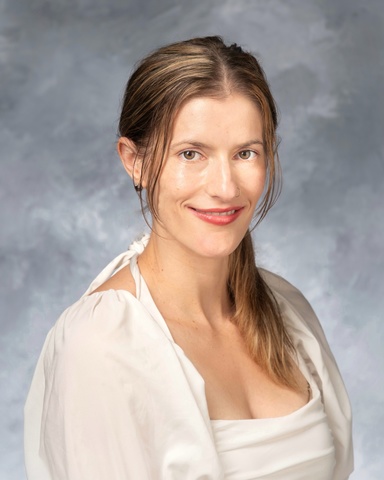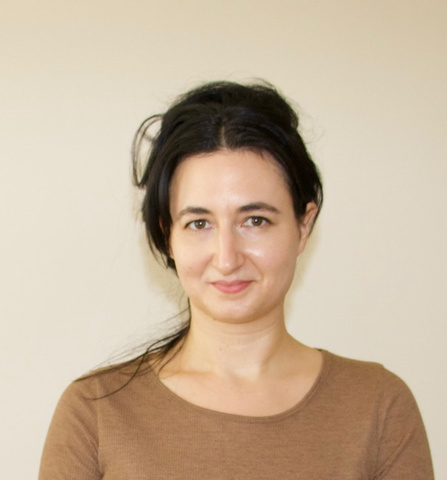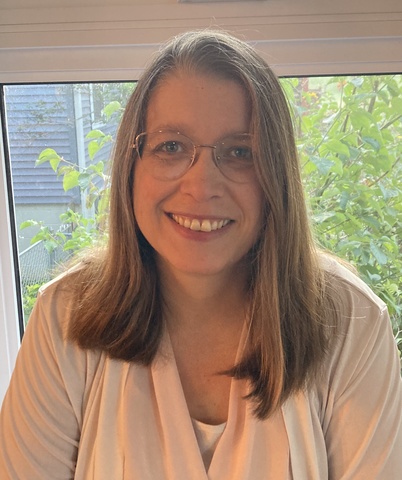By Alice Eberhart
Faculty across all disciplines are conducting interesting and exciting research and projects in the College of Liberal Arts and Sciences. Learn more about the research and work of Aislinn Conrad, Johanna Kasimow, and Sarit Smolikove.
Aislinn Conrad is an associate professor in the School of Social Work.
What is the focus of your work?
My research centers on two key areas related to child maltreatment prevention and income poverty, with a new focus on AI-enabled maltreatment identification. First, I investigate the relationship between household economic hardship and child maltreatment, including how income poverty and material hardship—such as difficulties in meeting basic needs like food, clothing, and shelter—affect child maltreatment. Second, I explore the various dimensions of household economic hardship, including income, material hardship, and emerging factors like household debt and perceived financial stress.

My work seeks to understand how these factors, both individually and in combination, contribute to the perpetration of child maltreatment. Recently, I've also begun exploring innovative AI-based approaches to child maltreatment identification, and in the future, prevention. Currently, I am testing the potential of an AI-enabled, single-camera technology to autonomously detect and classify acts of physical violence.
Tell us about the broad impact you’d like it to have.
I want my work to have a broad impact on both policy and practice in child welfare and poverty alleviation. By highlighting the components of household economic hardship and their connection to child maltreatment, I aim to shift the conversation beyond just income poverty to include material hardship and household debt. My hope is that this expanded understanding will push policymakers to rethink eligibility criteria for anti-poverty programs, leading to more effective interventions that reduce child maltreatment and enhance the well-being of families facing economic struggles.
In addition, through my work in AI-enabled child maltreatment identification, I aim to advance technology-driven solutions that can better detect and prevent violence. By combining advanced motion capture technology with AI to autonomously identify physical violence—something current methods often miss, especially in vulnerable populations—I hope to improve real-time monitoring and response systems. Even if this project does not fully succeed, it will contribute valuable insights into the limitations of motion capture technology and guide future developments in violence detection, ultimately impacting the way we approach child protection and intervention.
What excites you about the environment in CLAS?
CLAS has entered an exciting era, thanks to the tireless efforts of its leadership, faculty, and staff who are deeply committed to higher education. I have appreciated the opportunities for collaboration and networking with various departments within CLAS, as well as the support for my development as a scholar, including grant writing training, developmental awards, and leadership development.
What are your hobbies and pursuits outside of work?
There are so many! I write for fun, read, attend concerts and book readings, lift weights, practice yoga, and socialize with friends and family. I am convinced the best people live in Iowa City.
Any favorite things to do in Iowa City?
I never considered myself an outdoorsy person before moving to Iowa City. There's nothing better than hiking the local trails, cycling to a concert or festival, or enjoying a drink with friends on a patio.
Johanna Kasimow is an assistant professor of directing in the Department of Theatre Arts.
What is the focus of your work?
I create new plays through a process called “devising” or embodied playwriting. As a director, writer, and performer, I come together with a group of other artists around an idea, and we shape our imaginings into a live performance.

At the moment, I’m working on a new semi-autobiographical, experimental play called The Grüb. The piece employs theatrical and filmic idioms from clown to melodrama, grotesque and hyper-realism to meditate on how the stories of our families can take up residence in our own bodies. The seed of the piece is my father’s experience hiding underground as a young boy to escape from the Nazis. He, his sisters, and their parents lived for nearly two years in a hole underneath a barn outside Vilnius, Lithuania. What is the felt experience of hiding? How do we theatricalize and create a window into those minute embodied sensations that happen within us, where no one can see?
Tell us about the broad impact you’d like it to have.
Each new project proposes a different set of questions––about process, attention, form, content. My hope is that my work deeply engages these questions through performance with a spirit of curiosity and experimentation that builds on and expands the field of ensemble-based devised theater.
What excites you about the environment in CLAS?
I’m energized by the cross-disciplinary encounters I’ve had with students and colleagues through the Obermann Center for Advanced Studies and Hancher. I’m grateful to work at a public university that supports these vibrant spaces of intellectual and artistic life for the community.
What are your hobbies and pursuits outside of work?
I love basketball and watch Philadelphia 76ers games when I can. I like drawing, and making things with my hands, and cooking for friends.
Any favorite things to do in Iowa City?
I’m a big fan of City Park Pool and nearby places where I feel in the middle of nature. Public Space One and FilmScene are Iowa City gems.
Sarit Smolikove is a professor in the Department of Biology.
What is the focus of your work?
My research is focused on understanding DNA damage repair. The DNA in our bodies harbors the information of what makes us, but is under constant assault from internal and external factors (e.g. radiation, free radicals etc.) that damage it and lead to mutations. I am interested in the processes required to prevent such damage.

I am specifically focused on forms of DNA damage that are challenging to repair in the germline, the tissue that produces the eggs and sperm essential for reproduction. These questions cannot be investigated using tissue culture but require analysis in a whole organism. As a basic biologist, I use a model system to study this question, an organism that is easy to grow, analyze and make changes to its DNA composition. This widely used model organism is called Caenorhabditis elegans.
Tell us about the broad impact you’d like it to have.
My hope is to lead to better understanding of the mechanism of DNA damage repair in the germline. As a basic scientist my work is not directly impacting humans, but rather creates the foundation for such an impact, as DNA damage repair is directly related to cancer formation and cancer therapy. The mechanisms of DNA repair are highly evolutionarily conserved, which makes it a possibility.
What excites you about the environment in CLAS?
CLAS is a place where I feel at home and where I can grow as a person and as a scientist. It allows collaboration and is composed of people who are happy to listen to your ideas and help if needed.
What are your hobbies and pursuits outside of work?
Most of all I enjoy spending time with my family and friends, usually over home-cooked dinner, TV (Sci-Fi TV and Mockumentaries) or boardgame nights (Eurogame and escape room games). On my own, I garden, read and enjoy almost any form of craft (but mostly painting).
Any favorite things to do in Iowa City?
I enjoy our amazing restaurants, especially the excellent selection of international cuisine: Indian, Thai, Japanese, Middle Eastern and more. I’m also very fond of the many thrift/antique stores in the area.